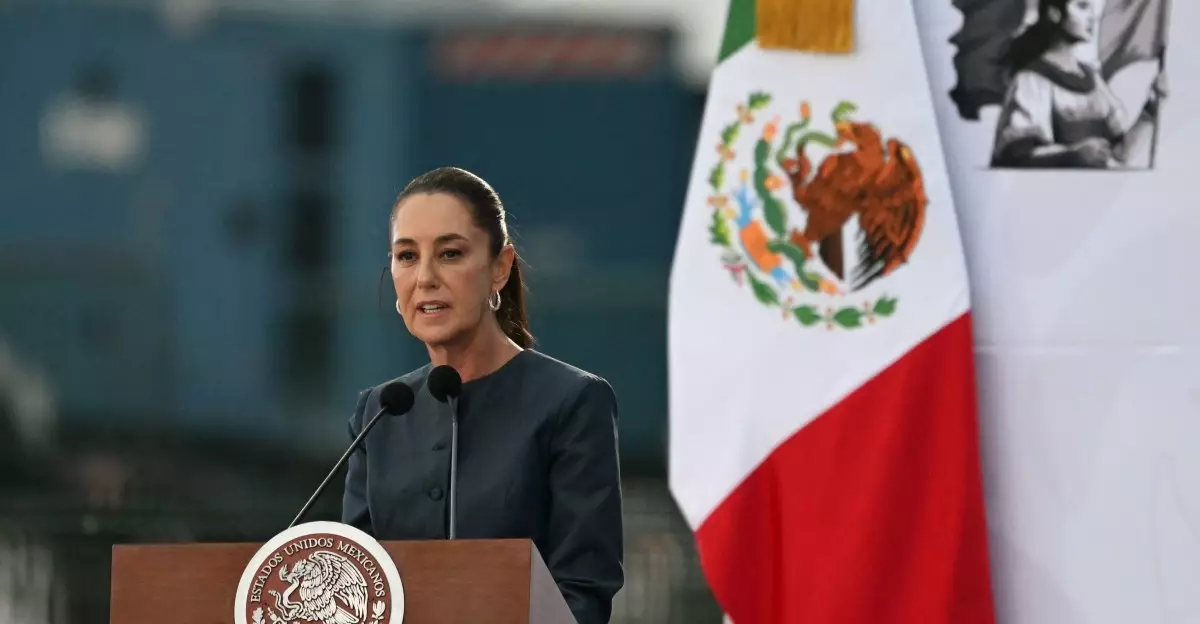In an unexpected flare-up in diplomatic tensions, Mexican President Claudia Sheinbaum has taken a firm stance against what she perceives as an affront to her country’s sovereignty. Following former President Donald Trump’s contentious decree to rename the Gulf of Mexico as the “Gulf of America” for U.S. audiences, Sheinbaum has initiated legal action against Google for adopting this controversial nomenclature in its mapping services. This incident underscores a broader struggle over national identity and regional recognition in a rapidly globalizing world, illustrating how geopolitical narratives can intertwine with even the most mundane aspects of technology and cartography.
Legal Action as a Form of Assertion
The lawsuit serves as a critical assertion of Mexico’s rights to its territorial waters and expresses discontent not just with Google, but with the underlying implications of Trump’s order. Sheinbaum articulates that the United States lacks the authority to impose a unified name for an international body of water that serves multiple countries, emphasizing that the existing nomenclature should reflect the perspectives of all nations surrounding it. Her administration’s legal maneuver is not only a matter of semantics; it is a reflection of national pride and historical context. By pursuing this suit, Sheinbaum effectively challenges the narrative that the United States can reshape international perceptions based on its internal policy decisions.
The Cartographic Controversy
Google’s decision to relabel the Gulf is emblematic of a larger trend in which technology companies find themselves entwined in political and cultural conflicts. The tech giant has the power to alter perceptions through its mapping services—creating realities that may not align with widely accepted geographical truths. The repercussions of this naming shift aren’t just academic; they resonate with citizens who feel their regional identities are being undermined by foreign political agendas. By fulfilling Trump’s directive, Google not only complied with a U.S. government decision but also planted seeds of discord in international relations, further complicating its already-toned relationship with many foreign governments.
A Chilly Response from the Tech Giants
While Sheinbaum’s government strives to pressure Google into compliance, it is noteworthy that other tech companies appear to have taken a more passive stance. For instance, MapQuest has not adopted the ‘Gulf of America’ label, suggesting a possible resistance to political pressures pushed by the U.S. administration. This divergence in response highlights the varying degrees of corporate accountability two of the largest tech players exhibit. It puts into question the responsibility of tech companies in matters of international significance and raises discussions about their role as gatekeepers of information. Should they remain neutral and adhere to established international agreements, or bow to pressures that align with specific national interests?
The Broader Implications of Name Changes
At a cursory glance, the gulf’s nomenclatural issue might seem trivial, but it has deep historical and emotional roots. Names do not merely denote physical locations; they encapsulate cultural identities, shared histories, and political realities. The attempt to rename a significant body of water is often an attempt to dominate the narrative around it—an act that erases local histories and undermines national pride. If a name can be altered at will, what other aspects of geography could follow suit? Entire cultures and heritages might be overshadowed by powerful geopolitical discourses that prioritize power over history.
A Call for Respect in Digital Spaces
In her announcements, Sheinbaum has voiced an appeal not just to Google but to the digital world at large: respect the nuanced complexities of international geography. This incident sheds light on a critical question for tech companies: how can they balance the articulation of a globalized perspective while also honoring specific national narratives? Corporations wield great influence in shaping cultural and geographical perceptions, and as digital spaces become increasingly pivotal in our lives, greater accountability in respecting territorial identities is essential.
In navigating the intersections of technology and politics, the case of the Gulf serves as a reminder of the significant influence that language and representation hold in the global landscape. It calls for continued vigilance against the dilution of national identities in an era dominated by corporate narratives and desires for geopolitical consolidation.

